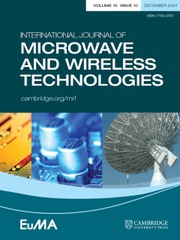Crossref Citations
This article has been cited by the following publications. This list is generated based on data provided by
Crossref.
Bhatt, Sagar
Mankodi, Parthesh
Desai, Arpan
and
Patel, Riki
2017.
Analysis of ultra wideband fractal antenna designs and their applications for wireless communication: A survey.
p.
1.
Akcelik, Huseyin
Durna, Yilmaz
Saraydemir, Safak
and
Kocer, Hasan
2017.
Measurement of a metamaterial antenna angular power reception performance utilizing Software Defined Radio.
AEU - International Journal of Electronics and Communications,
Vol. 75,
Issue. ,
p.
91.
Desai, Arpan
Upadhyaya, Trushit
Palandoken, Merih
Patel, Riki
and
Patel, Upesh
2017.
Dual band optically transparent antenna for wireless applications.
p.
960.
Upadhyaya, Trushit
Desai, Arpan
Patel, Riki
Patel, Upesh
Kaur, Kanwar Preet
and
Pandya, Killol
2017.
Compact transparent conductive oxide based dual band antenna for wireless applications.
p.
41.
Guo, Li
Tang, Ming‐Chun
and
Li, Daotong
2018.
A low‐profile dual‐polarized multilayer parasitic patch array antenna with narrow air gap.
Microwave and Optical Technology Letters,
Vol. 60,
Issue. 8,
p.
2022.
Patel, Riki H
Upadhyaya, Trushit
and
Desai, Arpan
2018.
Electrically small inverted L planar patch antenna for wireless application.
Microwave and Optical Technology Letters,
Vol. 60,
Issue. 10,
p.
2351.
Kaur, Kanwar Preet
and
Upadhyaya, Trushit
2018.
Wide‐angle and polarisation‐independent tri‐band dual‐layer microwave metamaterial absorber.
IET Microwaves, Antennas & Propagation,
Vol. 12,
Issue. 8,
p.
1428.
Patel, Riki
and
Upadhyaya, Trushit
2018.
An electrically small antenna for nearfield biomedical applications.
Microwave and Optical Technology Letters,
Vol. 60,
Issue. 3,
p.
556.
Kaur, Kanwar Preet
Upadhyaya, Trushit
and
Palandoken, Merih
2018.
Ultrathin wideband polarization independent compact metamaterial microwave absorber.
p.
1.
Gupta, Manisha
and
Mathur, Vinita
2018.
Multiband Multiple Elliptical Microstrip Patch Antenna with Circular Polarization.
Wireless Personal Communications,
Vol. 102,
Issue. 1,
p.
355.
Desai, Arpan
and
Upadhyaya, Trushit
2018.
Transparent dual band antenna with μ‐negative material loading for smart devices.
Microwave and Optical Technology Letters,
Vol. 60,
Issue. 11,
p.
2805.
Kaur, Kanwar Preet
Upadhyaya, Trushit
and
Alphones, Arokiaswami
2019.
Design of Ultrathin Dual-Directional Partially-Transparent Polarization Independent Metamaterial Absorber.
p.
518.
Kaur, Kanwar Preet
and
Upadhyaya, Trushit
2019.
Design and Analysis of Wideband Non-Transparent and Optically Transparent Microwave Metamaterial Absorbers.
p.
1892.
Upadhyaya, Trushit
Patel, Riki
Desai, Arpan
Patel, Upesh
Pandya, Killol
and
Kaur, Kanwar Preet
2019.
Electrically Tilted Broadband Antenna using Negative Refractive Index material.
p.
685.
Desai, Arpan
Upadhyaya, Trushit
Palandoken, Merih
and
Gocen, Cem
2019.
Dual band transparent antenna for wireless MIMO system applications.
Microwave and Optical Technology Letters,
Vol. 61,
Issue. 7,
p.
1845.
Patel, Upesh
and
Upadhyaya, Trushit K.
2019.
DESIGN AND ANALYSIS OF COMPACT µ-NEGATIVE MATERIAL LOADED WIDEBAND ELECTRICALLY COMPACT ANTENNA FOR WLAN/WIMAX APPLICATIONS.
Progress In Electromagnetics Research M,
Vol. 79,
Issue. ,
p.
11.
Upadhyaya, Trushit
Patel, Riki
Desai, Arpan
Kaur, Kanwar Preet
and
Patel, Upesh
2019.
Dual Band Planar Antenna For Wireless LAN and X-Wave Applications.
p.
1304.
Patel, Upesh
and
Upadhyaya, Trushit K.
2020.
DUAL BAND PLANAR ANTENNA FOR GSM AND WIMAX APPLICATIONS WITH INCLUSION OF MODIFIED SPLIT RING RESONATOR STRUCTURE.
Progress In Electromagnetics Research Letters,
Vol. 91,
Issue. ,
p.
1.
Vashi, Ronak
Upadhyaya, Trushit
Desai, Arpan
and
Patel, Riki
2020.
Second International Conference on Computer Networks and Communication Technologies.
Vol. 44,
Issue. ,
p.
827.
Patel, Upesh
Parekh, Megh
Desai, Arpan
and
Upadhyaya, Trushit
2021.
Wide slot tri‐band antenna for Wireless Local Area Network/World‐Wide Interoperability for Microwave Access applications.
International Journal of Communication Systems,
Vol. 34,
Issue. 12,


